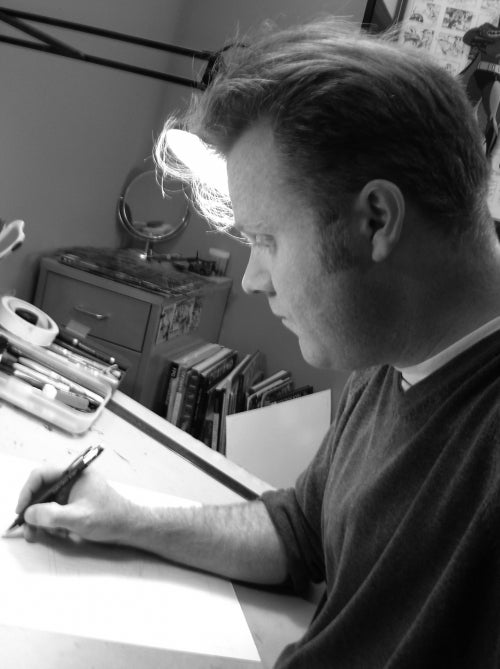
Scott Chantler (BA ’95) has been telling stories through visuals for 16 years as a comics artist and author, recently completing a term with the University of Windsor’s English department as their first-ever writer-in-residence with a comics background.
Scott began his career as a commercial illustrator in a corporate communications firm creating visual art for fortune 500 companies. His work in comics has received critical acclaim, including his graphic memoir, Two Generals which was listed in CBC Canada Reads: True Stories as one of the top 40 Canadian non-fiction books of all time and his fantasy book series Three Thieves, which won him a Joe Shuster Award for Best Comic for Kids in 2011.
With a passion for comics as a tool for education, Scott took time out from working on the seventh and final Three Thieves book, The Iron Hand, to speak with Alumni Relations about storytelling through visuals and life after Waterloo.
---------------------------------------------------------------------------
Can you tell us about how you brought your comics background to the writer-in-residence program at the University of Windsor?
On the one hand, the fact that I do comics was a big deal, because it’s the first time a cartoonist had held such a position at a Canadian university. But on the other hand, I’m a writer first and foremost. So I was in there talking plot, structure, character, theme, etc., just like any other writer would. That stuff doesn’t change much, whether you’re writing a screenplay, a novel, a short story, or comics. There were students interested in comics, certainly. But I dealt with student writers of all types.
You wrote a blog post titled “Yes, Cartoonists are Writers” after receiving some comments about the suitability of your background to your position at the University of Windsor. Can you tell us about this?
There were a few sideways glances when my position was announced, but I’m pleased to say not many. It really shows how far comics have come that people were mostly excited about my appointment. Very, very few looked down their noses and bemoaned the death of literature. And those who did mostly seemed confused that I wasn’t the artist-in-residence. But comics are a narrative form. What I do is about storytelling, not picture making.
Academics are starting to notice the importance comics have in education resulting in the founding of the Canadian Study of Comics. How do you feel about this shift in the way comics are perceived?
I think it’s the natural outgrowth of the huge enthusiasm that teachers and librarians started showing for comics twelve or fifteen years ago. The people who were kids then are in university now, so I think that’s why we’re starting to see a lot of this happening now. I think it’s great, and the next step in what’s been a long slog to respectability for this particular art form. I hope comics never get too respectable, though. One of the nice things about being an underdog is that it’s an invitation to take risks.
How do you feel comics act as a form of visual media comparable to the written word?
Comics can draw on all of the viscera of the visual arts, but are still intimate, like a book. You read them, rather than watch them with an audience. It’s interesting to work with one foot in either world.
You have an Arts degree from the University of Waterloo. Was it always your plan to get into the comic field after graduation?
Yes. Unlike today, there was nowhere you could go to really study comics specifically. So I put myself together an education with everything I thought I’d need: fine arts, film theory, English literature and creative writing, a little bit of acting and drama, and so on.
What advice do you have for students or young alumni thinking about breaking into a similar field of work?
Like any creative field, it’s difficult to make a living, even if your work is successful and well-regarded. Comics are also incredibly time-consuming to make, so it’s not something you can really do on the side of something else. So be prepared to spend a lot of time alone, and be broke. But it’s a great art form, one that can be incredibly subtle and meaningful. And it’s the one area of publishing that’s actually growing, so it’s rewarding to be part of that.






